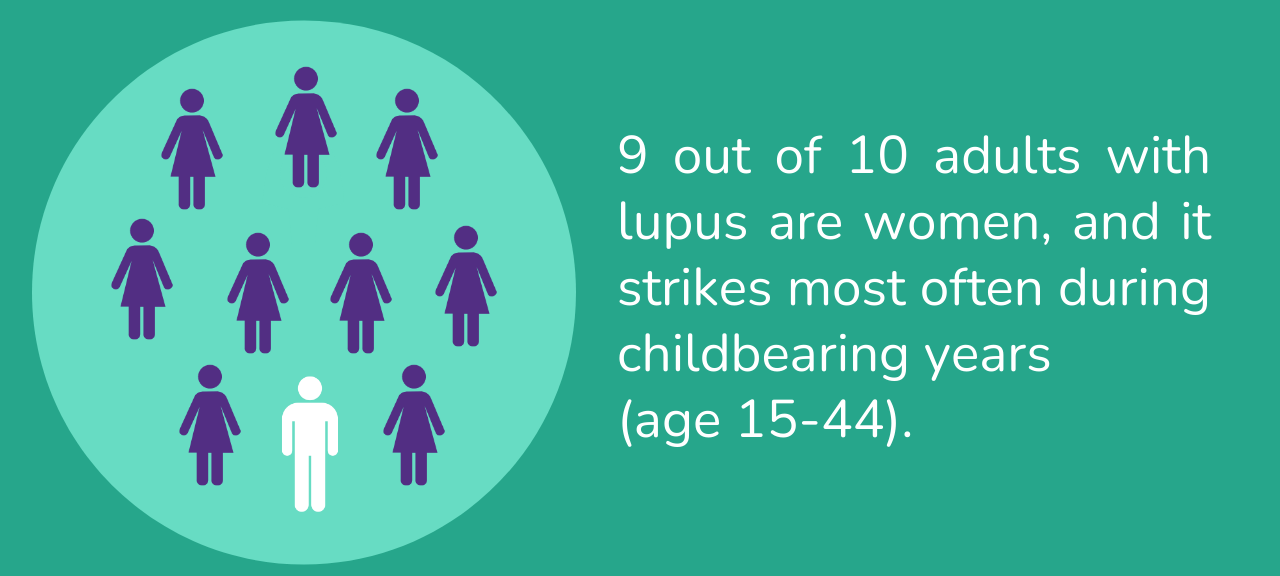How Lupus Affects Pregnancy & Breastfeeding
Disclaimer: This page houses important information and resources pertaining to lupus during pregnancy and while breastfeeding, including links to our evidence-based Fact Sheets. However, the resources here should not replace the care and advice of a medical professional.
Lupus (also known as systemic lupus erythematosus, or SLE), is a chronic (long-term) autoimmune disease that can cause inflammation in many parts of the body, including the skin, joints, kidneys, heart (pericardium), and brain. Many people with lupus experience pain, extreme fatigue, weight loss, and low fevers, among other symptoms. It is most often diagnosed during the childbearing years (ages 15-44), and 90% of adults living with lupus are women.

Reference: Pons-Estel et al., 2010.
People with lupus have a higher chance for complications during pregnancy, including miscarriage, preterm delivery, preeclampsia (a pregnancy-related condition characterized by a dangerous rise in blood pressure and problems with kidney function), and poor growth of the developing baby. Increased lupus activity, particularly during conception and early in pregnancy, increases the chance for these complications.
The best time to be pregnant is when you are doing well with your health. People whose lupus is in remission have much less trouble with pregnancy than those whose disease is active. It is strongly recommended that you meet with your doctor three to six months in advance of when you plan to try to become pregnant.
— Lupus Foundation
Healthcare providers believe that pregnancy outcomes for people with lupus are better if the disease is well controlled for at least 6 months before becoming pregnant. In addition, because lupus increases the risk of pregnancy complications, it is important to keep the disease as inactive as possible during pregnancy. Some medications used to treat lupus are not thought to increase pregnancy or breastfeeding risks, while others might be a concern. Be sure to talk to your healthcare provider about all of your pregnancy and breastfeeding questions.
Join Our Lupus Study
If you’re pregnant and have lupus, please consider enrolling into our observational study to give people better answers about how lupus and its management can affect a pregnancy and a developing baby. You will not be asked to take or change any medications, and you can participate from the comfort of your home.
Please see our library of resources below on lupus during pregnancy and breastfeeding.
Related Fact Sheets
Related Baby Blogs
Related Podcasts
External Resources
- American College of Rheumatology: Lupus
- Babycenter: Lupus and Breastfeeding
- Centers for Disease Control and Prevention: Having a Healthy Pregnancy with Lupus
- Healthy Outcomes in Pregnancy with SLE Through Education of Providers (HOP-STEP): Preparing for Pregnancy
- Lupus Foundation of America: Planning a Pregnancy when You Have Lupus
- March of Dimes: Lupus and Pregnancy
- U.S. Department of Health and Human Services, Office on Women’s Health: Pregnancy and Lupus
Partners
Stay in Touch
Our e-Newsletter brings you the latest information, news, and resources from the experts at MotherToBaby.
Join a Study
Expecting parents deserve better information about medication use in pregnancy and breastfeeding – and you can help by participating in a study.
Ask Our Experts
Call, text, chat, or email for a free personalized risk assessment on exposures in pregnancy and breastfeeding.

